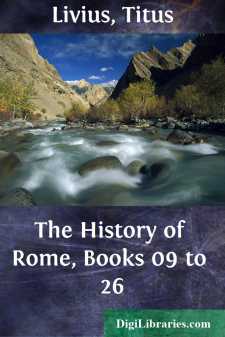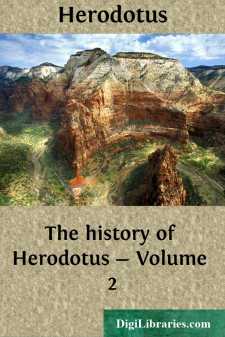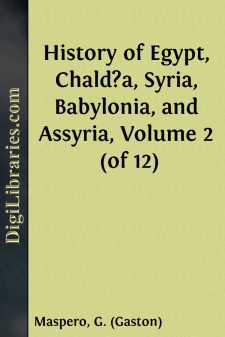History
- Africa 30
- Americas (North Central South West Indies) 50
- Ancient
- Asia 58
- Australia & New Zealand 8
- Canada 41
- Caribbean & West Indies 1
- Civilization 20
- Eastern Europe 12
- Europe 310
- Expeditions & Discoveries 60
- General 77
- Historical Geography 1
- Jewish 9
- Latin America 3
- Medieval 8
- Middle East 13
- Military 248
- Revolutionary 8
- Study & Teaching 5
- United States 353
- Western Europe 56
- World 13
Ancient Books
Sort by:
by:
George Long
PREFACE. Perhaps some may question the wisdom of putting out the Thoughts of Marcus Aurelius Antoninus to be used as a Reader by children in the schools. It may appear to them better suited to the mature mind. The principle, however, that has governed us in selecting reading for the young has been to secure the best that we could find in all ages for grown-up people. The milk and water diet provided...
more...
CHAPTER I—THE DISCOVERY OF PREHISTORIC EGYPT During the last ten years our conception of the beginnings of Egyptian antiquity has profoundly altered. When Prof. Maspero published the first volume of his great Histoire Ancienne des Peuples des l'Orient Classique, in 1895, Egyptian history, properly so called, still began with the Pyramid-builders, Sne-feru, Khufu, and Khafra (Cheops and...
more...
THE CÆSARS. The condition of the Roman Emperors has never yet been fully appreciated; nor has it been sufficiently perceived in what respects it was absolutely unique. There was but one Rome: no other city, as we are satisfied by the collation of many facts, either of ancient or modern times, has ever rivalled this astonishing metropolis in the grandeur of magnitude; and not many—if we except the...
more...
CHAPTER I. GIBBON'S EARLY LIFE UP TO THE TIME OF HIS LEAVING OXFORD. Edward Gibbon was born at Putney, near London, on 27th April in the year 1737. After the reformation of the calendar his birthday became the 8th of May. He was the eldest of a family of seven children; but his five brothers and only sister all died in early infancy, and he could remember in after life his sister alone, whom he...
more...
I.--The Nile and Egypt A long, low, level shore, scarcely rising above the sea, a chain of vaguely defined and ever-shifting lakes and marshes, then the triangular plain beyond, whose apex is thrust thirty leagues into the land--this, the Delta of Egypt, has gradually been acquired from the sea, and is, as it were, the gift of the Nile. Where the Delta ends, Egypt proper begins. It is only a strip of...
more...
by:
John Wilson Ross
CHAPTER I. TACITUS COULD BARELY HAVE WRITTEN THE ANNALS. I. From the chronological point of view.—II. The silence preserved about that work by all writers till the fifteenth century.—III. The age of the MSS. containing the Annals. I. The Annals and the History of Tacitus are like two houses in ruins: dismantled of their original proportions they perpetuate the splendour of Roman historiography, as...
more...
by:
Titus Livius
BOOK IX.B.C. 321-304 23 Titus Veturius and Spurius Postumius, with their army, surrounded by the Samnites at the Caudine forks; enter into a treaty, give six hundred hostages, and are sent under the yoke. The treaty declared invalid; the two generals and the other sureties sent back to the Samnites, but are not accepted. Not long after, Papirius Cursor obliterates this disgrace, by vanquishing the...
more...
by:
Herodotus
BOOK V. THE FIFTH BOOK OF THE HISTORIES, CALLED TERPSICHORE 1. In the meantime those of the Persians who had been left behind in Europe by Dareios, of whom Megabazos was the commander, had subdued the people of Perinthos first of the Hellespontians, since they refused to be subject to Dareios. These had in former times also been hardly dealt with by the Paionians: for the Paionians from the Strymon had...
more...
by:
Cassius Dio
BOOK 36, BOISSEVAIN.) The beginning of this book is missing in the MSS. The gist of the lost portion may in all probability be gathered from the following sentences of Xiphilinus (p. 3, R. Steph.): "When the consuls drew lots, Hortensius obtained the war against the Cretans. Because of his fondness, however, for residence in the capital, and because of the courts (in which his influence was only...
more...
CHAPTER I—THE POLITICAL CONSTITUTION OF EGYPT The king, the queen, and the royal princes—Administration under the Pharaohs—Feudalism and the Egyptian priesthood, the military—The citizens and country people. Between the Fayûm and the apex of the Delta, the Lybian range expands and forms a vast and slightly undulating table-land, which runs parallel to the Nile for nearly thirty leagues. The...
more...











